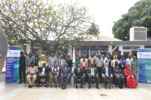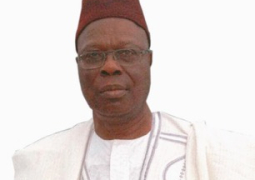
The laboratory, built at the Police Headquarters will help The Gambia to build the operational capacity of the structures in charge of digital forensic investigations.
Speaking at a ceremony held at the Atlantic Hotel in Banjul, Ousman A. Bah, the minister of Communications and Digital Economy, expressed delight at the ECOWAS Commission and the European Union (EU) for choosing The Gambia out of 16 countries in the sub-region and Mauritania, as a pilot for the establishment of the Digital Forensics Laboratory.
Minister Bah continued that cognizant of the growth in the usage of digital products and services in The Gambia, it is essential for social economic and sustainable development. He said the government is aware of the corresponding threats that hamper the effective and efficient utilisation of these products by people and businesses.
“An effective fight against cybercrime is urgent and overdue. This can only succeed with a well-coordinated effort which is paramount to instituting deterrence and redress mechanisms coupled with the requisite capacity to ensure safer and more resilient cyberspace. The timeliness of the initiative, which is geared towards combating cybercrime, cannot be overemphasised,” the minister stated.
Raphael Brigandi, EU Gambia delegate representative, also stated that the overall objective of the project is to contribute to enhancing cyber security and combating cybercrime, in order to improve the resilience and robustness of the information infrastructure; and to improve the capacity of the stakeholders in charge of combating cybercrime.
“Around 70% of the countries worldwide are insufficiently protected against cybercrime. Today, in a world that is more digitally connected than ever, addressing this form of criminality is a major concern for law enforcement. Criminals take advantage of the online transformation to target weaknesses in online systems, networks and infrastructure, and engage into pushing, ransomware, and data breaches,” he emphasised.
He said the impact of cyber criminality is substantial in terms of its economic and social impact on governments, businesses and individuals worldwide.
Sediko Douka, the ECOWAS commissioner, explained that the globe is becoming increasingly interconnected every minute with access to internet expansion, saying on a positive note, the ECOWAS region is not being left behind, as internet access is on the increase with a penetration rate of around 54% as at December 2021.
“Accordingly, this upsurge is creating increased opportunities for innovation and highlights why the region needs to accelerate the digital transformation efforts across all sectors to meet the growing demands of citizens. Equally, the increased opportunities are also fostering the presence of more malicious actors who exploit the internet vulnerabilities, increasing cyber risks, threats, and attacks,” Commissioner Douka said.
He reiterated that the diverse nature of cybercrimes requires a variety of tools for digital forensics while stating that the availability and utilisation of these tools to identify, preserve, examine, and analyse digital footage obtained from a crime scene can uncover valuable evidence that can support law enforcement in an investigation.
Other speakers included the representative of the Inspector General of Police and the minister of Interior.





